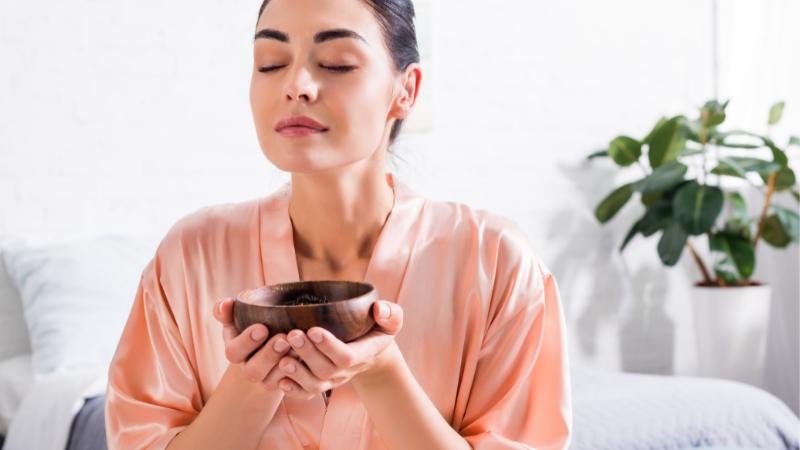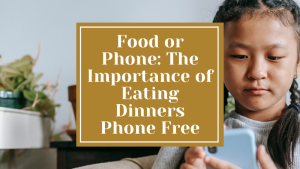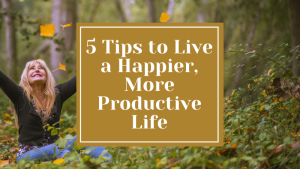In recent years, many alternative treatments and therapies for anxiety have emerged since anxiety is one of the most pervasive mental health issues today. Essential oils and aromatherapy are one promising alternative treatment, and have proven to be very effective at controlling symptoms.
According to a University of Maryland Medical Center report (Stephen D. Ehrlich, NMD, 2011), aromatherapy can be defined as “the use of essential oils from plants as therapy to improve physical, emotional and spiritual well-being.”
That study also explains clearly how researchers theorize this works,
“The “smell” receptors in your nose communicate with parts of your brain (the amygdala and hippocampus) that serve as storehouses for emotions and memories. When you breathe in essential oil molecules, some researchers believe they stimulate these parts of your brain and influence physical, emotional, and mental health.” (Ehrlich, NMD, 2011).
Essential oil molecules go directly to the brain when inhaled, and also enter the bloodstream quickly when applied to the skin.
If applied directly to the skin, a carrier oil such as almond, coconut or olive oil should be used. Some practitioners put a few drops of the oil mixture in the palm and then rub the hands together. Then, they sniff their hands. In addition, the oils can be used with a diffuser, which is available over-the-counter.
Amazon has a large collection online with an average price of $25.00. Or, you can simply boil some water and then add a few drops to the hot water and breathe in the steam. Many people add a few drops to their bath, too. Many practitioners believe that aromatherapy, or the inhaling of essential oils, is the most powerful way to treat anxiety.
In a recent blogpost, Cynthia Bowman reported that inhaling essential oils creates signals that go directly to the limbic system, which rules the emotions. So, smelling these oils often triggers a sense of peace, joy, contentment or excitement.
Besides triggering emotions, the limbic system is directly connected to the parts of the brain that control blood pressure, heart rate, breathing, memory, stress levels, and hormone balance. Further, she posts, “feeding the limbic system with healing essential oils balances emotions and the functions that the limbic system controls.”
Another interesting facet of using essential oils to treat anxiety is that according to a study in the European Society of Cardiology, less is more. The optimal time of exposure is 1 hour per week. The effects are long-lasting and pervasive.
Everyone who wants to use essentials oils for healing should experiment and find the one, or ones, that work best for them. Personally, I love peppermint oil and keep it with me always. I have chronic headaches and use peppermint oil to alleviate pain and tension. Sometimes I add lavender and eucalyptus, especially if my sinuses and allergies are acting up.
THE MOST POPULAR AND EFFECTIVE ESSENTIAL OILS TO USE FOR ANXIETY WITH AROMATHERAPY.
1. Clary sage: A 2010 research study with rats documented clary sage (S. sclarea) essential oil’s antidepressant effects, suggesting that it could be a useful essential oil for depression and anxiety (cited by Dorene Petersen, Sept. 22, 2014 on the American College of Healthcare Sciences blog).
New studies reveal that smudging with sage, as the American Indians and other ancient cultures do, actually clears the air of viruses and bacteria, thereby purifying the area. One scientific paper entitled “Medicinal Smokes” which was published in the Journal of Ethnopharmacology, focuses a scientific lens on the practice, which is becoming more and more widely practiced, despite skepticism.”
2. Bergamot: a heavy hitter for treating anxiety! One study with elementary school teachers showed that as little as a ten minute exposure weekly to bergamot aromatherapy resulted in lower blood pressure, heart rate and reported a lessening oof overall stress and anxiety.
3. Peppermint: my favorite! I keep it with me and use it whenever needed during the day. It dilates blood vessels, helping me to breathe when my nose feels stuffy.
4. Lavender: traditionally used to treat headaches, it is a favorite to use as an anti-anxiety essential oil. “The Handbook of Essential Oils: Science, Technology, and Applications, Second Edition” states that there have been a number of clinical trials involving the inhalation of lavender essential oil that indicate a reduction in stress (http://draxe.com/16-ways-to-bust-stress/) and anxiety.
5. Rose: a sweet floral scent, that often induces harmonious feelings. “One of the benefits of rose essential oil is it’s very settling to the emotional heart and perhaps the second most popular after lavender for relieving anxiety and depression, helping with panic attacks, grieving and shock.”
6. Frankincense: reported as a healer in Chinese medicine since 500 BC; used by ancient Egyptians and presented to Baby Jesus by the wise men; recent studies indicate it is a powerful mood stabilizer. An ancient ingredient for healing treatments, frankincense was used in Chinese medicine as far back as 500 BC. Pliny the Elder cited the healing properties of frankincense due to its analgesic, astringent, and anesthetic properties.
According to the website Organic Facts, “Frankincense Oil is very effective as a sedative, because it induces a feeling of mental peace, relaxation, satisfaction and spirituality. It also awakens insight, makes you more introspective and lowers anxiety, anger and stress. When feeling anxious or if you anticipate some sort of stressful episode, add some frankincense oil to a diffuser or a vaporizer. Frankincense essential oil promotes deep breathing and relaxation, which can open your breathing passages and reduce blood pressure, moving your mental state back to calmness.”
In a Science Daily report, the authors report that “An international team of scientists, including researchers from Johns Hopkins University and the Hebrew University in Jerusalem, describe how burning frankincense (resin from the Boswellia plant) activates poorly understood ion channels in the brain to alleviate [anxious feelings].”
The use of frankincense to heal and soothe is well-documented and has been successfully used for thousands of years. Churches use it to this day in their services.
7. Ylang Ylang: this popular aromatic essential oil can treat anxiety and depression due to its calming and uplifting effects. Traditionally, ylang ylang helps with cheerfulness, courage, optimism and soothes fearfulness. It may calm heart agitation and nervous palpitations and is a moderately strong sedative, which can help with insomnia.
8. Vetiver: a Haitian grass, “Vetiver oil has a tranquil, grounding and reassuring energy, often used in trauma helping with self-awareness, calmness and stabilization. A nervous system tonic, it decreases jitteriness and hypersensitivity and is also useful in panic attacks and shock. It is also used successfully to treat ADHD.
Some other popular essential oils include: Cedarwood. Spruce, Jasmine, Marjoram, and Basil. Blends of different essential oils are also effective ways to treat anxiety. Like I use blends of peppermint, eucalyptus, and lavender, one can create their own individual scent blend.
Be sure and use sweet almond oil, olive or coconut oil as a carrier for best results. Many companies offer premixed blends as well. Try always to buy and use therapeutic or pharmaceutical grade essential oils to be sure you have the highest quality.
Experiment and find the ones that resonate with you. Then use them to help create your own healing garden, no matter where you are.



